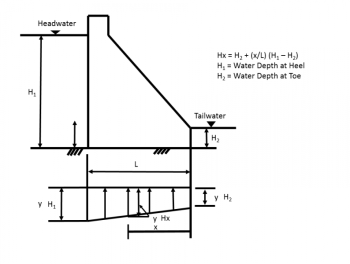Global Stability of a Dam: Difference between revisions
No edit summary |
No edit summary |
||
| Line 12: | Line 12: | ||
When a dam impounds a body of water, it will experience a load or force commonly referred to as hydrostatic pressure. A variety of other forces such as uplift pressure, earth pressure, silt pressure, wave pressure, wind pressure, ice pressure, [[seismic]] acceleration, hydrodynamic pressure, and thermal stress from ambient temperature changes can also act on the dam depending upon site conditions. Global [[stability]] refers to the ability of the dam to withstand all design [[Loading Conditions|loading conditions]] with adequate safety margin. This is a function of the geometry and material properties of the dam as well as the magnitude and combination of loads acting on the structure. | When a dam impounds a body of water, it will experience a load or force commonly referred to as hydrostatic pressure. A variety of other forces such as uplift pressure, earth pressure, silt pressure, wave pressure, wind pressure, ice pressure, [[seismic]] acceleration, hydrodynamic pressure, and thermal stress from ambient temperature changes can also act on the dam depending upon site conditions. Global [[stability]] refers to the ability of the dam to withstand all design [[Loading Conditions|loading conditions]] with adequate safety margin. This is a function of the geometry and material properties of the dam as well as the magnitude and combination of loads acting on the structure. | ||
While this is imperative for gravity-type dams, global stability must also be demonstrated for appurtenances that impound water. For example, labyrinth spillway weir walls which impound the upper-most portion of a reservoir must be stable under normal and flood loadings. Failure of such a structure would result in the uncontrolled release of a portion of the reservoir. Therefore, they should be designed to gravity dam standards to resist overturning/sliding. This may require supplemental restraint such as grouted anchors due to the relatively low mass of the structure to resist the driving forces imposed by the reservoir. | |||
==Required Data== | ==Required Data== | ||
Revision as of 20:14, 17 March 2023

|
| Learn more about the need to consider uplift pressure when designing a gravity structure at DamFailures.org |
When a dam impounds a body of water, it will experience a load or force commonly referred to as hydrostatic pressure. A variety of other forces such as uplift pressure, earth pressure, silt pressure, wave pressure, wind pressure, ice pressure, seismic acceleration, hydrodynamic pressure, and thermal stress from ambient temperature changes can also act on the dam depending upon site conditions. Global stability refers to the ability of the dam to withstand all design loading conditions with adequate safety margin. This is a function of the geometry and material properties of the dam as well as the magnitude and combination of loads acting on the structure.
While this is imperative for gravity-type dams, global stability must also be demonstrated for appurtenances that impound water. For example, labyrinth spillway weir walls which impound the upper-most portion of a reservoir must be stable under normal and flood loadings. Failure of such a structure would result in the uncontrolled release of a portion of the reservoir. Therefore, they should be designed to gravity dam standards to resist overturning/sliding. This may require supplemental restraint such as grouted anchors due to the relatively low mass of the structure to resist the driving forces imposed by the reservoir.
Required Data
Evaluation Criteria
Types of Analyses
Examples
![]() Learn more about the need to consider uplift pressure (DamFailures.org)
Learn more about the need to consider uplift pressure (DamFailures.org)
![]() Learn from the critical oversights that led to the failure of St. Francis Dam (DamFailures.org)
Learn from the critical oversights that led to the failure of St. Francis Dam (DamFailures.org)
Best Practices Resources
![]() Design Standards No. 13: Embankment Dams (Ch. 13: Seismic Analysis and Design), USBR, 2015
Design Standards No. 13: Embankment Dams (Ch. 13: Seismic Analysis and Design), USBR, 2015
![]() Earthquake Design and Evaluation of Concrete Hydraulic Structures (EM 1110-2-6053), USACE, 2007
Earthquake Design and Evaluation of Concrete Hydraulic Structures (EM 1110-2-6053), USACE, 2007
![]() Stability Analysis of Concrete Structures (EM 1110-2-2100), USACE, 2005
Stability Analysis of Concrete Structures (EM 1110-2-2100), USACE, 2005
![]() Roller-Compacted Concrete (EM 1110-2-2006), USACE, 2000
Roller-Compacted Concrete (EM 1110-2-2006), USACE, 2000
![]() Gravity Dam Design (EM 1110-2-2200), USACE, 1995
Gravity Dam Design (EM 1110-2-2200), USACE, 1995
![]() Arch Dam Design (EM 1110-2-2201), USACE, 1994
Arch Dam Design (EM 1110-2-2201), USACE, 1994
![]() Sliding Stability for Concrete Structures (ETL 1110-2-256), USACE, 1981
Sliding Stability for Concrete Structures (ETL 1110-2-256), USACE, 1981
![]() Design of Small Dams, USBR, 1987
Design of Small Dams, USBR, 1987
Trainings
![]() On-Demand Webinar: Rehabilitation of Concrete Dams
On-Demand Webinar: Rehabilitation of Concrete Dams
![]() On-Demand Webinar: Stability Evaluations of Concrete Dams
On-Demand Webinar: Stability Evaluations of Concrete Dams
![]() On-Demand Webinar: Analysis of Concrete Arch Dams
On-Demand Webinar: Analysis of Concrete Arch Dams
![]() On-Demand Webinar: Introduction to Concrete Gravity Dams
On-Demand Webinar: Introduction to Concrete Gravity Dams
Citations:
Revision ID: 6708
Revision Date: 03/17/2023
